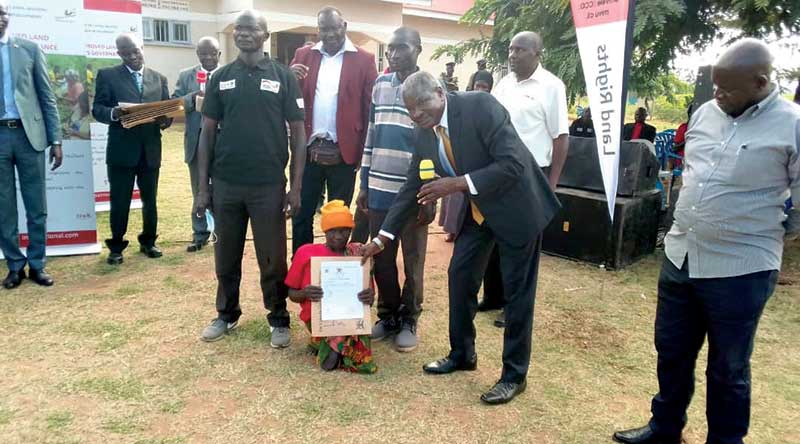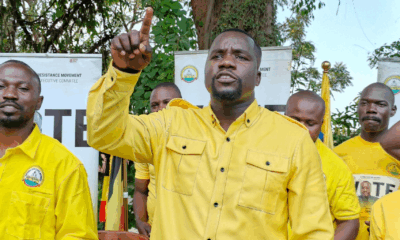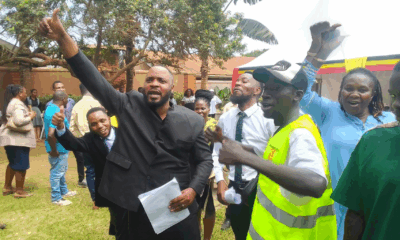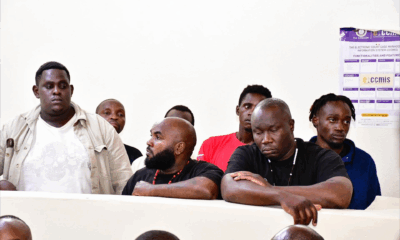News
Gov’t to prioritize distribution of Agric. inputs to customary land title holders

Urban Dev’t State Minister Obiga Kania handing over a CCO title to Ms. Andiru Mariana measuring 77.1 acres in Terego recently
In a milestone development, up to 623 families in Terego district of Northern Uganda have secured their rights over land through the revolutionary new procedure of issuing of customary land titles. They join more than 72,000 families that have since 2015 received Certificate of Customary Ownership (CCO), an alternative system of land registration that is being promoted across the country to cure the problem of land conflicts and landlessness.
The Minister of State for Urban Development Obiga Kania hailed the people of Terego for embracing the government programme, and not listen to naysayers.
Minister Kania was at Uriama sub-county, in Terego district on November 9, to officiate at the ceremony during which he handed out Certificates of Customary Ownership titles on behalf of the newly registered land owners in Terego district.
Besides securing their rights over their land, Minister Kania listed several other benefits of the customary land title system that is gathering interest in the region.
He cited access to the new Parish Development Model, reduction in land disputes and land evictions as well as increasing the value of the land, as some of the many benefits of the programme.
Minister Kania said: “The first step in fighting poverty under the Parish Model Development interventions is to register the land on which we are all going to invest, so that no one disrupts or evicts you and your family from the land on which you are going to carry out wealth creation activities.
He added that: “The Constitution and the Land Act provide the legal basis and Framework for Government to register and issue these titles to customary land owners at the sub-county. The Certificates you will receive today are mandated by law to protect your land. They are recognized by all Government institutions and the Courts of Law. You now have legal documents as land owners, which will speak for you anywhere in the world.”
Minister Kania said that due to lack of proper registration of customary land owners, in places such as Terego, many people lost land to refugees and other displaced persons, while others are paid peanuts as rent for their land with no agreements being made to protect them as the land owners.
“This title will now protect your land as long as it has your family names on it,” he said.
In another demonstration of the benefits of the customary land yet again, the Minister said the government intends to start distributing farm inputs starting with those that have obtained CCOs.
“Our next task is to ensure that the registered owners are assisted with agricultural inputs like seedlings of an identified cash crop in the Parish to start cash crop growing and to register those renting land at the Sub County, as provided for under the Land act.
This will help to move from subsistence to the money economy with help of the Parish revolving funds set up by Government to enhance the agricultural value chains of production, storage, processing and marketing of the identified cash crop in the Parishes.
Minister Kania praised President Yoweri Museveni for his visionary leadership in championing the process of registering land under the Communal land system:
“I thank H.E the President for his visionary leadership in helping Ugandans to register their customary land. The NRM Manifesto has clearly pledged to register customary land and issue people with these titles. It is only through such actions that we shall move to conquer hunger and food insecurity,” said Kania.
Dennis Oboo, the Spokesperson of the Ministry of Lands and Urban Planning, highlighted a number of benefits for the Certificate of Customary Ownership (CCOs) including ease in securing the title, easier dispute resolution mechanisms and full recognition by the government and financial institutions.
“CCOs are affordable in terms of fees payable (10,000 for application and issuance) with the process beginning at the Sub county, then to the District and ends at the Sub county with issuance of the CCOs. Freeholds pay (70,000 for the same, including payment of between UGX 5 – 8 million for surveying to Registered Private Surveyors). Very few customary land owners can afford this, and yet their customary titles have GPS coordinates that can effectively show their land boundaries.
The customary title grants you ownership for ever, the same the freehold title does. The land act in section 8, says whoever receives a certificate of customary ownership is the conclusive owner of the land. That puts it at the same level with the Freehold title. The only difference between the two is the procedure that is used to acquire the title.”
“For the CCO, the process starts at the sub county. The area land committee demarcates your land on land form 23, submits it to physical planning (department) to confirm compliance and then it goes to the district land board for approval. Once that is done, the instruction comes from the district land board to the sub-county chief who is the recorder – the registrar of customary land titles and he registers it and issues it on the instructions of the district land board.
“For free hold, you also begin at sub-county; go to the district land board but the process ends at the regional level. But along the way, they refer you to the surveyor, which requires more money on the part of the owner, to survey the land.
Easier dispute resolution with CCOs
According to Oboo, settling land disputes has been simplified under customary land ownership.
“The dispute mechanisms for the CCO are that traditional institutions are the ones that preside over. But for Freehold, it is the Commissioner Land Registration and Courts of law, that decide who the owner is. So people are safer when they these CCO because there you know it is going to be your traditional institutions (such as cultural leaders) that will decide your case. And of course, services are brought nearer. Because remember for Freehold, you have to go to the zonal office, but here it is the sub-county that acts as the registry of CCOs.
And, besides easing the process, Obo observes that the acquisition of a CCO is a highly inclusive process that requires that all members of the family (in the case that a title is issue in the name of a clan) are registered without discrimination.
“To issue a title in the names of the clan, the clan must first form a legal entity, and that legal entity must have a book where everybody is listed as the members who own that land. The clan is represented by nine (9) people who form a management committee. It’s those nine people who make decisions on behalf of others. If they have not approved any action, that action is null and void. These are what we call Communal Land Associations. So the name of the Association is what you put on the title. So the land remains intact, but for them, they keep updating their records for people who have died, or those that have been born. How they share the land is a separate book, but it remains one fragmented land.”
The Lands Ministry says that where CCOs have been issued, they have helped to minimize conflict between people and communities, but they have also helped to ward off encroachers and illegal evictions.
“Indeed it has been effective in stopping and challenging the land grabbers and cancelling the Freeholds and/or leases the land grabbers may have acquired. Hence CCOs increase the level of tenure security for the right holders thus allowing planning for longer-term development of the land and have the potential to turn land from liability to asset for development.”
Comments
























